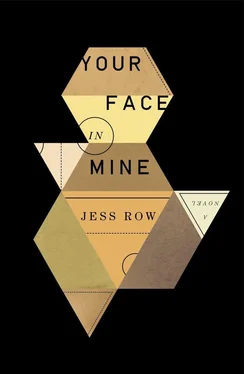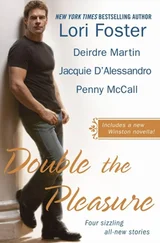Heretical and criminal methods.
Martin, I say, mouthing the words, almost. You found me. It feels good to say it. Who else would have believed you? With the evidence of, what, your own body? Before-and-after pictures? When something was missing, or, rather, when everything was missing? — a coherent plan, a shred of evidence, of preparation, of anything other than Martin himself, his own body? And the story.
Who would have believed that story, other than me?
Why pretend it was a coincidence? I clench my fists. If you brush by a person on the street, that’s because you knew them in five hundred previous lifetimes. Karma locked us together. Here I am, I’m thinking, forgiving him. Almost out of a sense of duty. What did I want to say to him, when I watched him walking away on that street in Towson in 1993, after the funeral? We still have each other. Men, heterosexual men, can’t say such things, can they? Not at age nineteen. So we have to think of other, harmful ways to say it. We have to harm each other to make our dependence clear. Puer aeternus. Pueri aeterni.
Did he know I’d been to China? That I had married Wendy? Did he know I’d watched their coffins go into the crematorium one after another, the ashes mixed?
He knew he could draw me in somehow. That’s the kind of sick genius he is. He knew I’d be lost by now, and ready to jump out of my skin.
Martin, I say, mouthing the words again, maybe you’re right. Maybe I’m just raw materials, too.
And then another voice, Wendy’s voice, unmistakably: you’ve been inside yourself far too long. Time to come out. Time to come out.
• • •
Well, I’m just going to talk, then, Julie-nah says, after a few minutes have passed and I’m still staring straight up into the fan’s rotors, as if dangling from an invisible noose. Maybe it’ll help. I doubt it, but just maybe. So look. You have to understand that for this thing to work, this enterprise, they need to have as many successful models, prototypes, whatever you want to call them — us — as possible. And in particular what we don’t have is anyone transitioning to an Asian GI. Goal Identity . Has Martin told you that term? Anyway, it’s a real stumbling block. Granted, the candidates are going to be rare. For the moment. But you can’t launch a product like this in Asia with the implication that somehow Asians aren’t, well, as desirable. You need that press conference and it needs to look like the world. So it all started back in January, when we got a call from Martin. A conference call. Silpa was there, too. He says, I’ve got the perfect one, but he’s not there yet. He needs some coaching—
Julie-nah, I say loudly, so she can hear me, that’s enough. I get it.
You do?
Yeah. I lick my lips, readying myself for the lie. I suspected it all along.
Then maybe you’re a better candidate than I thought.
Instead of answering, I step out from underneath the fan, my body flushing with warmth, and cross the room to switch it off. Miles’s muted trumpet trickles across the room — it’s a cliché to say it, to even think it, but what else can you say? — like smoke.
What would it be like, I’m thinking, to take a sound and follow it to its logical conclusion, as if it had a logical conclusion? I pick up the iPod and flick the wheel until it lands on Bob Marley . All I have is an album of ambient remixes, something a friend sent me for a party mix years ago. I click on Exodus . A whooshing sound, a lot of echoing congas, and then the throbbing bass line, the tsks of the hi-hat. I listened to just enough Marley in college to know the words by heart. We’re gonna walk, all right, through the roads of creation.
Are you thinking what I’m thinking? Julie-nah says.
From a pocket in her shorts she takes out a small, flat, red-and-white metal tin. An Altoids tin. And inside, of course, an expertly rolled joint, dagger-sharp at both ends, and a yellow Bic lighter. This is another thing I learned at Brown, she says, lighting up. Don’t leave home without it. She swallows the smoke in a gulp, tilts her chin toward the ceiling, and blows it out in a blue stream. You’d probably prefer vodka or Scotch or something, she says. Better for the nerves. But Tariko won’t have it. I mean, sure, for a party or something. But he doesn’t like it in the fridge. This , on the other hand, he’s happy to supply. All you have to do is ask.
Maybe in a minute. Give me a minute.
Take all the time you need.
Remember, I’m asking myself, remember thinking as a joke about becoming Beat Takeshi? Is there a sound I could follow back to that source? A sound, a texture, a taste? When I was first learning to cook Chinese food, Wendy would push me out of the way with her hip and say, that’s not the way to do it. It won’t taste right that way. What was I doing wrong? I would ask. I don’t know. I can’t explain it. Her mother was more straightforward. Once she tasted some black chicken soup I’d made, squinted, and said, the problem is, Lao Kaili, you’re not Chinese.
I walk over to the bedside table and unscrew the thermos Julie-nah brought, letting the steam rise under my nose. How do you describe the smell of congee? The glutinous starchy smell of cooked rice, obviously, and then the undercurrent of smoked meat, the knuckles or hock or whatever spare bit was cooked in the pot. I look down; she’s distributed salted greens and bits of fried onion on the surface. I stick a finger in — it’s boiling hot — and lick it off. If I wasn’t afraid of searing my throat I’d guzzle it all right now.
I could follow this, I’m thinking. The food you crave when you’re sick. When you’re flat on your back. The first food in your baby daughter’s mouth. I could follow it, could I, could I follow it all the way down, all the way back?
Wendy speaking:
You could. You could.
You want to know what it was, for me? Julie says.
She sits cross-legged in a wreath of smoke.
I let myself fall into the chair next to the window, on the far side of the bed. Just close enough that if I reached out a foot — not that I would do such a thing — I could touch her leg.
It was Love Story , she says. You know that movie? From the Seventies? I saw it when I was in high school. Bizarrely enough. For a class on American culture. The teacher had a strange sense of humor. I mean, yes, it is ostensibly about autonomy and freedom from one’s parents and so on. But try showing that movie to a roomful of sixteen-year-old girls who’ve hardly even been on a date. We went through a box of tissues and an entire roll of paper towels. And I, I, I mean — I was the most affected, you could say, of all of us. When I looked at Ali MacGraw’s face, my eyes burned. The way she spoke to him. The way she laughed. The way she suffered . It was all there! You didn’t need the subtitles. I’d never seen a face like that. I tried, when I was at home, looking at the mirror, to make all those expressions. And I couldn’t. I had no range of feeling. My face was hollow. It was a mask. By comparison, it wasn’t even human .
So, look, she says, it wasn’t as if I’d never seen a white woman’s face before. The ads were full of them. But after that I couldn’t stop staring at them. Bus stops, billboards, magazines. I started cutting out pictures of white women laughing and saving them in an envelope. I thought it would be a good art project. This was a top girls’ school; our teachers were very savvy, very postmodern. By Korean standards. We knew what feminism was. We knew what the male gaze meant. So I told myself that it was an intellectual interest, and I went on telling myself that all the way through college and graduate school. I was desperate to go to college in the United States, but Dad wouldn’t let me.
Читать дальше












